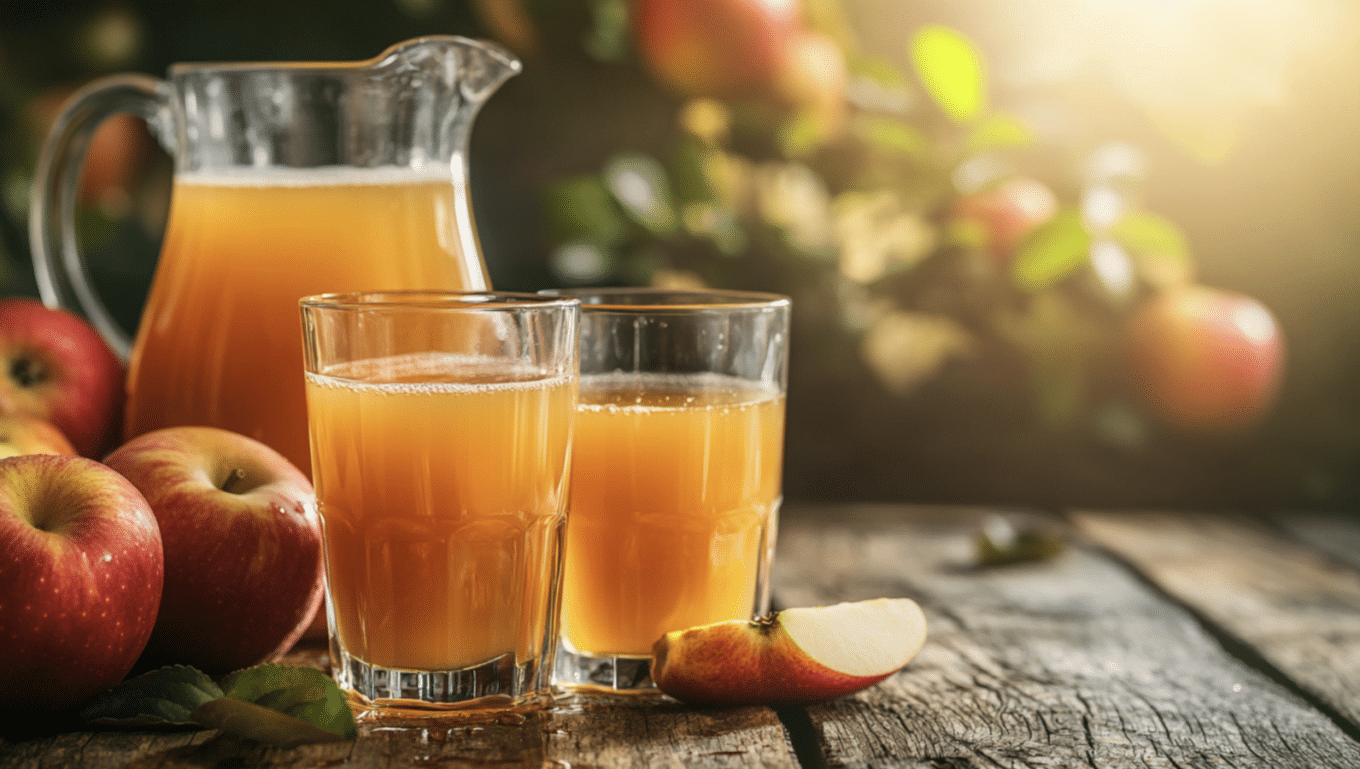Many of us enjoy a glass of apple juice, but have you ever wondered about its fiber content?
Is the fiber content in apple juice the same as eating a whole apple? An important point to consider is which one is more healthy and beneficial.
This post will help you understand the fiber content of apple juice and the other nutritional content of apples.
You’ll learn how the juicing process changes the amount of fiber in your drink. We’ll compare the fiber content of whole apples to apple juice and explain why these changes matter for your health.
By the end of this article, you’ll know exactly what you’re getting in your glass of apple juice. The content covers fiber types, fiber content, digestive benefits, and health impacts.
Plus, you’ll find tips on how to get more fiber in your diet, even if you love your apple juice.
Does Apple Juice Help You Poop?
Many people wonder about the effects of apple juice on their digestive system.
Apple juice contains sorbitol, a sugar alcohol that is a natural laxative. Sorbitol pulls water into your intestines, softening your stool and making it easier to pass.
Unlike harsh laxatives, apple juice offers a gentler approach, helping to relieve constipation without causing discomfort or urgency.
Drinking apple juice regularly can support healthy bowel movements over time, but moderation is key.
Too much apple juice could lead to tummy troubles, so a small glass daily is usually enough to see benefits.
Fiber in Apple Juice
Let’s talk about the fiber in apple juice and why it matters for digestion.
1. Fiber Content in Apple Juice
Not all apple juices are created equal when it comes to fiber. Clear apple juice, which you often see on store shelves, has very little fiber.
The filtering process removes most of it. Cloudy apple juice, however, keeps more of the apple’s natural fiber.
Here’s a quick comparison:
- Clear apple juice: About 0.1 grams of fiber per cup
- Cloudy apple juice: Up to 0.5 grams of fiber per cup
As you can see, even cloudy juice has much less fiber than a whole apple, which has about 4.4 grams. The juicing process, especially for clear juice, strips away much fiber.
2. Types of Fiber
Apple juice contains two main types of fiber:
Soluble fiber: This is mainly pectin in apple juice. Pectin is great for your gut health. It can help feed good bacteria in your intestines and may even help lower cholesterol.
Cloudy apple juice has more pectin than clear juice.
Insoluble fiber: Apple juice does not contain much of this type. Most insoluble fiber is left behind in the pulp during juicing.
This type of fiber helps add bulk to your stool and keeps things moving through your digestive system.
Impact of Apple Juice Fiber on Digestive Regularity
Let’s explore how apple juice can affect your digestive health and keep things running smoothly.
Apple juice contains soluble fiber, mainly pectin. This fiber forms a gel-like substance in your gut, which helps in a few ways.
Soluble fiber slows digestion, giving your body more time to absorb nutrients. It also helps soften your stool, making it easier to pass. This can be especially helpful if you have constipation.
The fiber in apple juice also feeds the good bacteria in your gut. These bacteria produce short-chain fatty acids, which are great for colon health.
Remember, the amount of fiber in apple juice can vary. Cloudy or unfiltered apple juice tends to have more fiber than clear juice.
If you want to boost your fiber intake, you might want to choose these types of apple juice.
Nutritional Ingredients in Apples
| Nutrient | Content in Whole Apples | Content in Apple Juice (250 ml) | Benefits for Digestive Health |
|---|---|---|---|
| Vitamin C | 14% of the recommended intake in a medium-sized apple | 2-30 mg per 100 ml (higher in fresh, cloudy juice) | Boosts immune function and aids in gut motility |
| Fibers | 4.4 grams per medium-sized apple | 0.2-0.5 grams | Promotes regular bowel movements, residual fiber aids digestion |
| Pectin | Rich in whole apples | 0.1-0.6 grams | Forms a gel-like substance in the digestive tract, regulating digestion |
| Phytochemicals | Various flavonoids, phenolic acids, anthocyanins | 100-200 mg | Potent antioxidants reduce Inflammation in the gut |
Digestive Benefits of Apple Juice

Apple juice offers numerous advantages for your digestive system. Let’s explore how this tasty drink can help keep your gut happy and healthy.
1. Eases Gastrointestinal Disorders
The malic acid found in apple juice can help soothe various gastrointestinal problems.
It may reduce bloating and cramps by stimulating liver function, which in turn aids digestion and supports overall gut health.
2. Supports a Healthy Gut Microbiome
Apple juice contains pectin, a soluble fiber that acts as a prebiotic. Prebiotics feed the good gut bacteria, helping maintain a balanced and healthy microbiome.
This balance is crucial for proper digestion and nutrient absorption.
3. Reduces Inflammation
The phytochemicals in apple juice have antioxidant properties that can help reduce Inflammation in your digestive tract.
By protecting your gut lining from damage, these compounds contribute to better overall digestive health.
4. Promotes Regular Bowel Movements
Drinking apple juice regularly can help maintain consistent bowel movements.
This is due to its mild laxative effect and high water content, which are important for keeping stool soft and preventing constipation.
5. Reduces Risk of Chronic Digestive Conditions
Studies suggest that apple juice’s polyphenols may lower the risk of certain chronic digestive conditions, including colon cancer.
Regular consumption of these antioxidants could help protect against various gastrointestinal diseases.
Comparison with Other Fruit Juices
| Aspect | Apple Juice | Orange Juice | Grape Juice | Prune Juice |
|---|---|---|---|---|
| Fiber Content | Lower (0.2-0.5 grams per 250 ml) | Higher (more natural fiber retained) | Lower, easier on the stomach | High (rich in both sorbitol and fiber) |
| Sorbitol Content | High (acts as a gentle laxative) | None | Lower (less likely to cause gas/bloating) | Very High (strong laxative effect) |
| Vitamin C | 2-30 mg per 100 ml | Very high (rich in vitamin C and folate) | Moderate | Moderate |
| Digestive Benefits | The gentle laxative effect supports gut health | Supports digestion through vitamin C and folate | Easier to digest, less likely to cause discomfort | Powerful laxative, effective for constipation |
| Antioxidants (Polyphenols) | 100-200 mg per 250 ml | High (contains various antioxidants) | High (rich in polyphenols) | High (rich in polyphenols) |
| Suitability for Regular Consumption | High (pleasant taste, broad vitamin range) | High (nutritious, supports overall health) | High (gentle on the stomach) | Moderate (effective but may be too strong for daily use) |
Practical Tips for Incorporating Apple Juice into Your Diet
Want to enjoy apple juice while keeping your gut happy? Here are some easy ways to do it:
1. Moderation
Start by monitoring your drinking. A good rule of thumb is to stick to about 240 mL (one cup) daily.
This way, you get the benefits without overdoing it on sugar.
2. Combine with Fiber-Rich Foods
Try pairing your apple juice with foods high in fiber. This combo can boost the digestive perks.
For example, you could have juice alongside a bowl of oatmeal or whole-grain toast.
3. Creative Ways
Let’s make it fun! Here are some tasty ideas.
Smoothies: Toss some apple juice in your blender with spinach or kale. You’ll get a sweet green smoothie packed with nutrients.
Breakfast: A splash of apple juice can add sweetness to your morning oatmeal or cereal. It’s an easy way to change up your usual routine.
Desserts: Try using apple juice as a natural sweetener in your baking. It can add moisture and flavor to muffins or cakes while reducing added sugars.
Potential Side Effects and How to Mitigate Them
While apple juice can benefit you, knowing about possible side effects is important. Let’s look at some issues you might face and how to avoid them.
1. Gastrointestinal Issues
Apple juice is sweet, and that sweetness comes from sugar. If you drink too much, you might have diarrhea.
The juice also contains sorbitol, which can cause gas and bloating in some people.
If you have a sensitive stomach, you might want to start with small amounts to see how your body reacts.
2. Increased Risk of Tooth Decay
The natural sugars in apple juice can be tough on your teeth. They can wear away the enamel, which protects your teeth from decay.
To help prevent this, try rinsing your mouth with water after you drink apple juice. This can wash away some of the sugars left on your teeth.
Here are some simple ways to enjoy apple juice while avoiding potential problems:
- Mix your juice with water. This waters down the sugar, making it easier on your stomach and teeth. You could start with half juice and half water and adjust to your liking.
- Try having your apple juice with meals. Eating food along with the juice can help your body handle the sugars better. This can reduce the chance of stomach upset and help keep your blood sugar more stable.
Conclusion
So, does apple juice make you poop? The answer is yes, it can help.
Apple juice contains sorbitol, a natural laxative that can ease constipation. It’s also packed with nutrients that support digestive health.
However, moderation is key. Too much apple juice might lead to tummy troubles or blood sugar spikes.
While apple juice can be a tasty digestive aid, it’s not a miracle cure. It works best as part of a balanced diet rich in whole fruits, vegetables, and fiber.
It’s always best to consult a healthcare professional when dealing with ongoing digestive issues.
Ready to try apple juice? Start small, maybe with a 4-ounce glass a day. Listen to your body and adjust as needed.
Here’s to happy sipping and smoother digestion!
Frequently Asked Questions
How Much Apple Juice Should I Drink for Digestive Benefits?
Start with 4-8 ounces daily. To avoid excess sugar intake, don’t exceed 12 ounces per day. Adjust based on your body’s response.
Is Cloudy Apple Juice Better than Clear Apple Juice?
Cloudy apple juice contains more fiber and nutrients than clear juice, making it slightly better for digestion and overall health benefits.
Is it Better to Eat Whole Apples or Drink Apple Juice for Digestion?
Whole apples are generally better for digestion due to their higher fiber content. However, apple juice can still offer some benefits in moderation.




